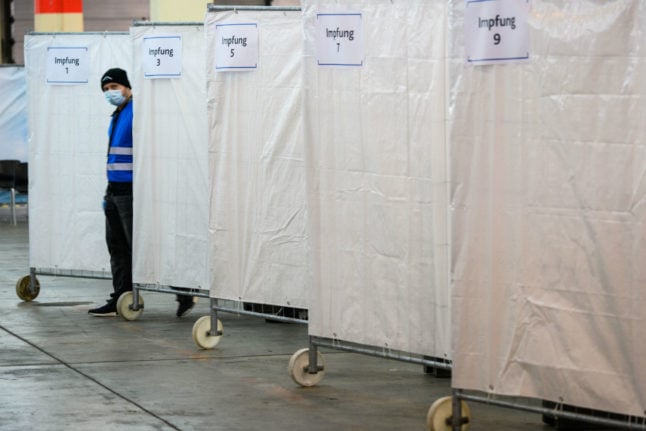Experts say that the first doses of the vaccine are likely to arrive in December, and possibly in January.
Yet, as not enough doses will initially arrive to reach everyone in Germany who wants a vaccination, the Standing Committee on Vaccination (STIKO) of the Robert Koch Institute has made the first recommendation of who should receive a jab, and when.
READ ALSO: EXPLAINED: How Germany is preparing for the coronavirus vaccination
Residents of care homes, as well as those over 80 years of age, will receive the first round of the vaccination, said STIKO on Monday.
People in health care professions are also to be given preference for the vaccine. According to the StiKo list, this includes hospital staff with a high exposure risk, for example people working in an emergency room.
Health personnel are to be inoculated first, as they maintain close contact with risk groups. This includes, for example, transplantation physicians, maintenance personnel in the ambulatory old person care or personnel in homes with contact to residents.
Overall, STIKO estimates that about 8.6 million people out of the roughly 83 million in Germany will be first in line to receive the vaccine.
STIKO's draft is set to be followed by a three-day procedure in which German states and experts can submit their comments. This process will end on Thursday.
The final recommendation will then be published. Germany’s Ministry of Health will prepare a legal regulation, which is to be published later in December.
Germany is currently setting up 60 coronavirus vaccine centres, in locations as diverse as old airports and skating rinks.
However, it’s also likely that some of the vaccinations could be given at normal doctors’ practices rather than special centres, as not all would be required to be deep cooled.
Unequal distribution?
Yet welfare organisations have warned of social conflicts and growing inequality in connection with immunisation.
“As soon as there is an approved vaccine, we will experience a distribution debate,” said the managing director of the German Paritätischer Wohlfahrtsverband Parity Welfare Association), Ulrich Schneider, to the newspapers of the Funke Media Group on Monday.
Health risk groups and medical staff would be vaccinated first, followed by those who keep the economy running and are considered systemically relevant, Schneider said.
Those who are regarded as less important from a social and economic point of view will have to “take a back seat”, Schneider said. “This will naturally lead to conflicts.”
In addition, the distribution of the vaccine will develop into a conflict between rich and poor as soon as more vaccine doses are available worldwide, he added.
German health minister Jens Spahn (CDU) said in late November that Germany has now secured more than 300 million vaccine doses through the EU Commission or bilateral agreements.
“Even with two doses per vaccination, we would then have enough for our own population and could share with other countries,” said Spahn, adding that everyone in the population could be vaccinated before the end of 2021.
With an eye on applications by BioNTech-Pfizer as well as Moderna for the use of their Covid-19 vaccines in Europe, German chancellor Angela Merkel said 70 million doses in total from both types of vaccines can be delivered in the first quarter of next year if they are given authorisation.
READ ALSO: Merkel says Germany to read 70 million doses of coronavirus vaccine



 Please whitelist us to continue reading.
Please whitelist us to continue reading.
Member comments